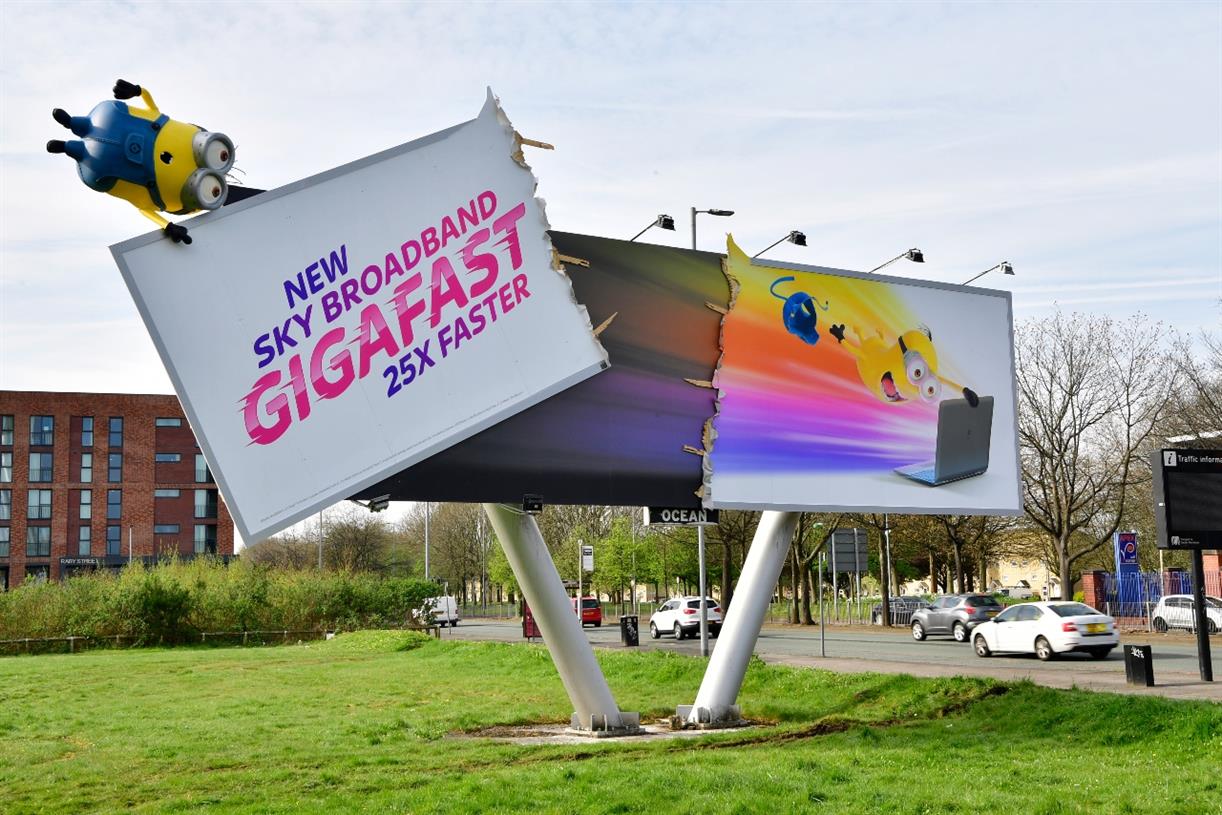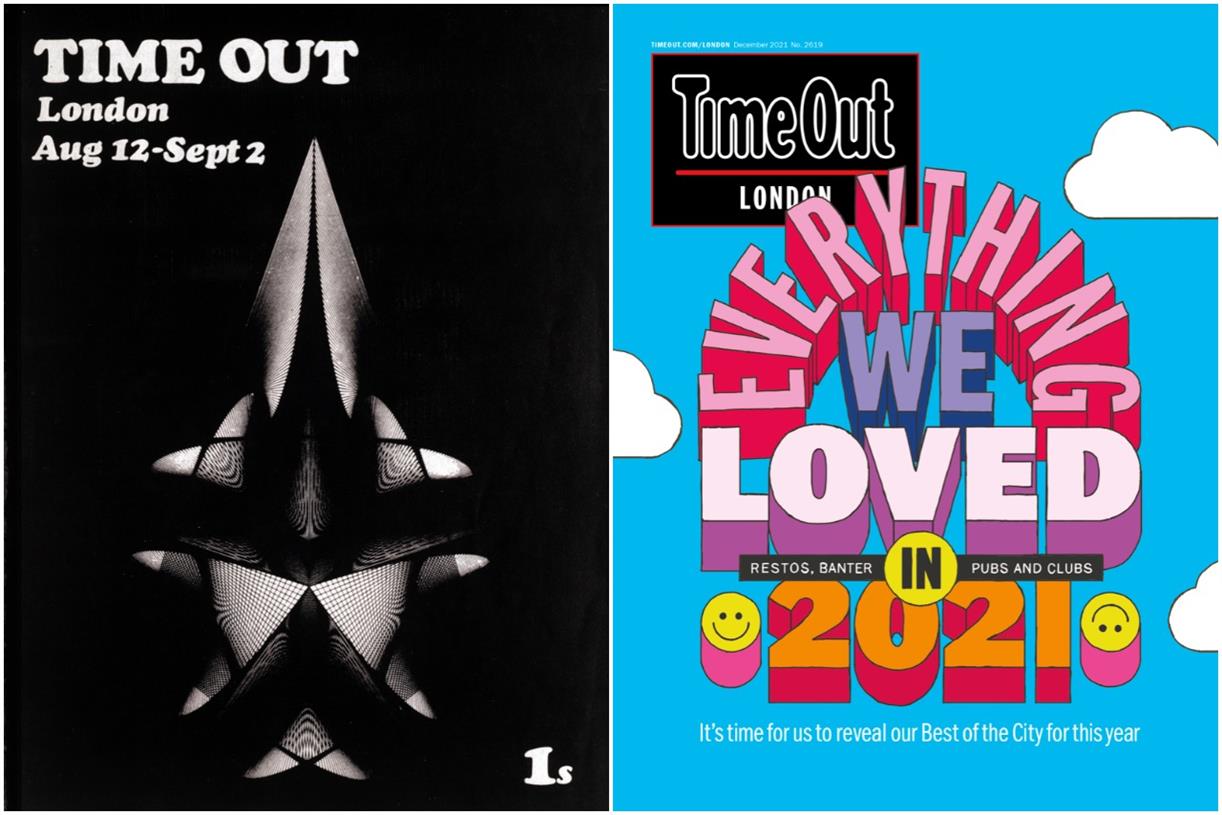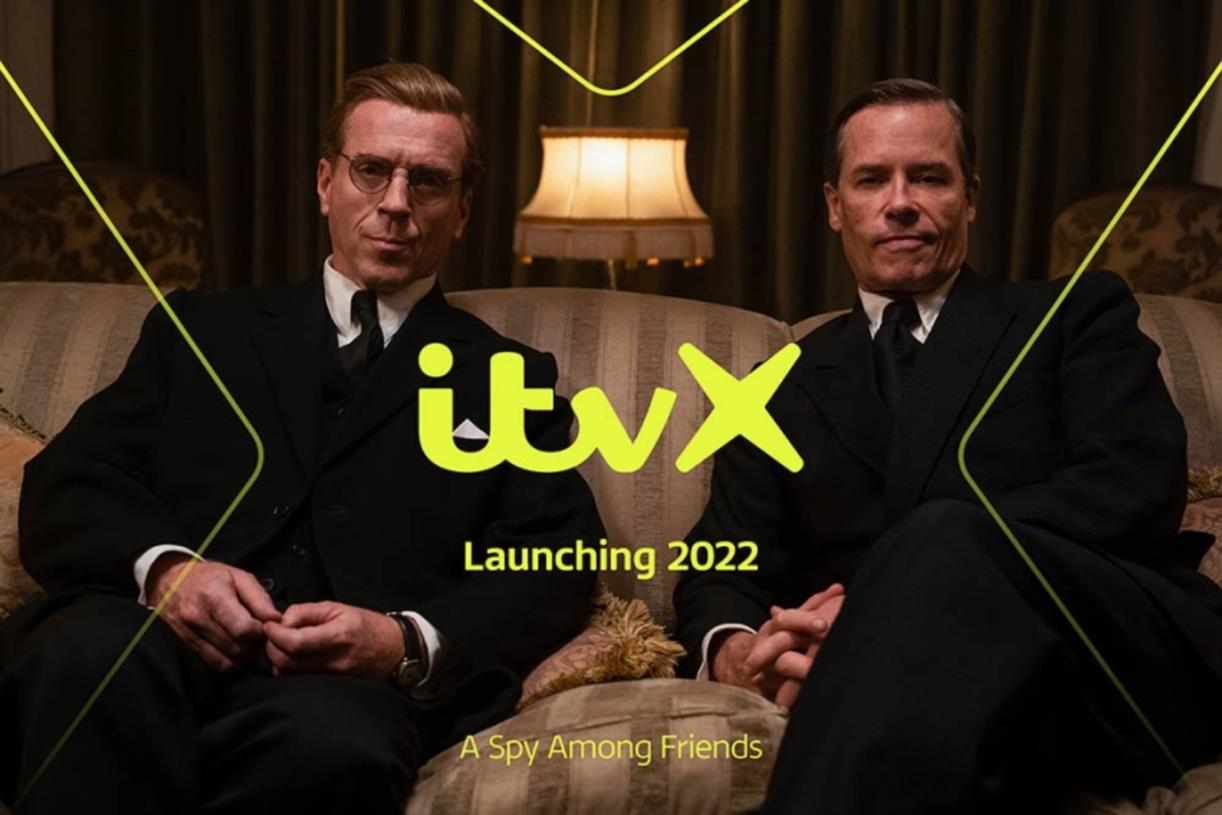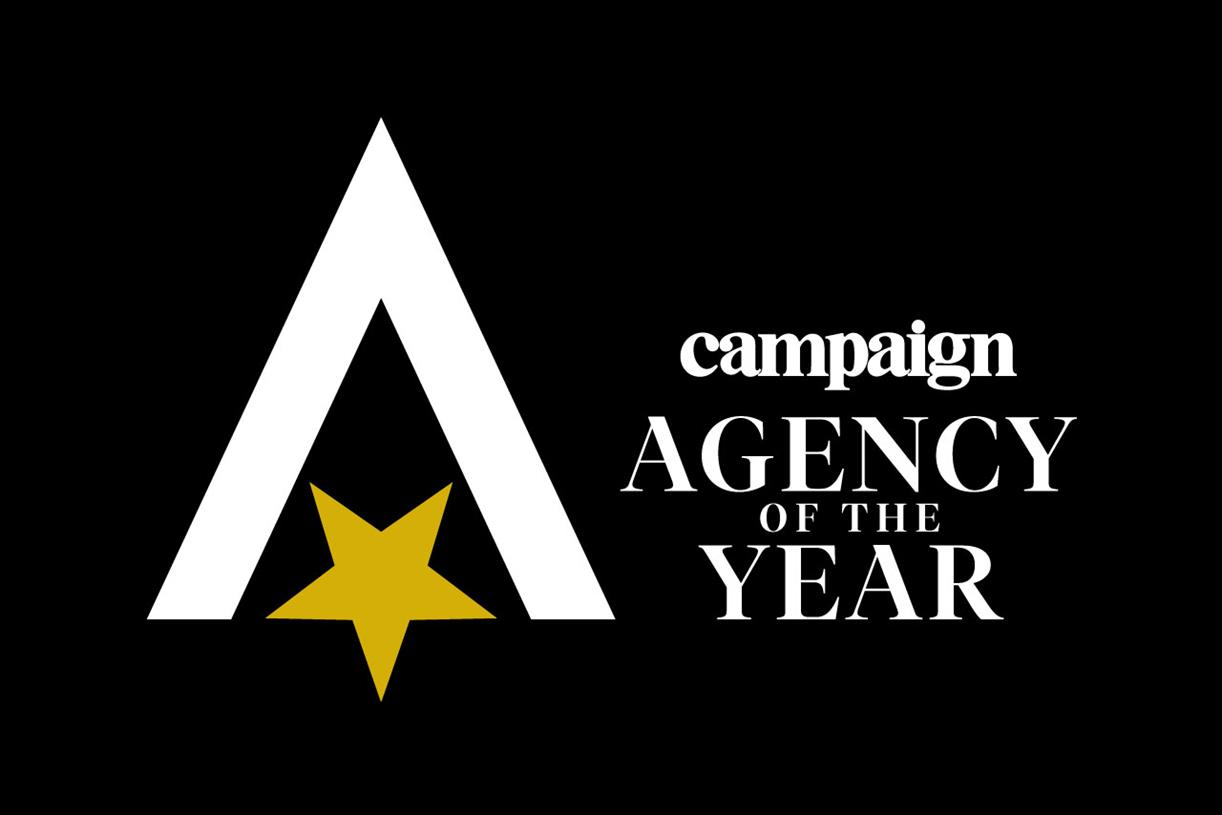What Are Good Weaknesses to Say in an Interview That Aren’t “I’m a Perfectionist”?
I’ve been told countless times that the hardest part about getting a job at my dream company (Nickelodeon — spoiler alert, I got it!) is getting my foot in the door.

I’ve been told countless times that the hardest part about getting a job at my dream company (Nickelodeon — spoiler alert, I got it!) is getting my foot in the door. I wrote and submitted the perfect resume and tried my best to make a lasting impression during the phone screen. The final step was winning over my hiring manager in the face-to-face interview. In my interview prep, I practiced answering many common interview questions, including “What is your greatest weakness?” This question never fails to trip me up, as it often feels like a trick or test. I’m trying to sell myself at the highest caliber, and you want me to say what’s wrong with me? The key is finding the perfect balance between being able to admit that no one is perfect and not listing weaknesses that would prevent you from succeeding at the role. Here, I’ve cultivated some incredible answers to “What is your greatest weakness?” — and don‘t worry, these answers aren’t, “I’m a perfectionist.” Table of Contents Interviewers who ask, “What is your greatest weakness?” want to know how honest and self-aware you are. They also seek evidence that you have a drive to improve upon your weaknesses. When I think about the most common shortcomings people in my field experience, I ask myself: The best answers to this question sincerely explain a weakness and provide an example of how you are actively working to improve. If you’re not sure where to start, check out this list of typical interview weaknesses: Pro tip: I always try to tailor my weaknesses to the role at hand. I think about the job requirements and the types of answers that would make hiring managers want to work with me, then choose the most honest answer to the question that won't make the hiring manager question my fit for the role. I spoke with Nehal Patel, the director of research technology and innovation and hiring manager at Smith & Nephew. He agreed, saying, “Good areas to point to for this question are organizational skills that can improve as new tools become available, or interpersonal skills that can continuously advance as you work with new people with different styles.” Here are some strong examples of how to answer “What is your greatest weakness?” and why they work. “I can struggle when working with a team — I am incredibly self-sufficient, so it's difficult to rely on others to complete my work. That's why I've pursued roles that require someone to work independently. However, I've also worked to improve this weakness by enrolling in team-building workshops. While I typically work independently, I must learn to trust my coworkers and ask for outside help when necessary.” This answer works because the weakness — the inability to work well with a team — doesn‘t hinder your ability to perform well in the role, since it’s a job that doesn't rely on teamwork to succeed. Additionally, you display an eagerness to develop strategies to combat your weakness, which is a critical workplace skill. “I struggle with organization. While it has yet to impact my performance, I've noticed my messy desk and cluttered inbox interfere with my efficiency. Over time, I've learned to set aside time to organize my physical and digital space, and I've seen it improve my efficiency levels throughout the week.” I am the biggest culprit of a messy workspace with half-empty coffee mugs, coiled charger and headphone cords, and long-finished lunches that need to be thrown out. This answer works because it‘s a relatable and fixable weakness. You note that disorganization doesn’t interfere with your ability to do your job, which is critical, but you also acknowledge it might make you less efficient. To ensure you‘re performing at 100%, you mention personal steps you’ve taken to improve your organization skills for the sake of self-improvement alone, which suggests a level of maturity and self-awareness. "I sometimes find it difficult to delegate responsibility when I can finish the task well myself. However, when I became manager in my last role, it became imperative I learn to delegate tasks to ease some of the work off of my plate while allowing my direct reports to take on more responsibility. To maintain a sense of control when delegating tasks, I implemented a project management system to oversee the progress of a project. This system enabled me to improve my ability to delegate efficiently." This answer allows you to demonstrate an ability to pursue a new skill when a role calls for it and suggests you're capable of flexibility, which is critical for long-term growth. Additionally, you showcase a level of initiative and leadership when you mention the successful implementation of a new process that enabled you to succeed in your past role, despite your weakness. “Often, I can be timid when providing constructive feedback to coworkers or managers, out of fear of hurting someone's feelings. However, in my last role, my coworker asked me to edit some of his pieces and provide feedback for areas of improvement. Through my experience with him, I realized feedback can be helpful and kind when delivered correctly. Since then, I've become better at offering feedback and realized I can use empathy to provide thoughtful, productive feedback.” While interning at the HubSpot Blog, I copyedited guest writers’ posts. I always wondered why I, a college student, had the right to provide detailed feedback to a professional writer. With time, I’ve learned that constructive feedback is always beneficial to people when presented respectfully, regardless of their level or experience. This answer works because you've explained how you could turn a weakness into a strength through real-world experience. Typically, timidity can be seen as a flaw in the workplace, particularly if a role requires someone to give feedback to others. In this case, you can show how timidity can be used as a strength, through thoughtful reflection and practice. "My blunt, straightforward nature has allowed me to succeed over the years as a team manager, because I can get things done efficiently, and people often appreciate my honesty. However, I've recognized my bluntness doesn’t always serve my employees well when delivering feedback. To combat this, I've worked to develop empathy and deeper relationships with those I manage. Additionally, I took an online leadership management course, and worked with the professor to develop my ability to deliver feedback." Facets of our personalities can help us in certain areas of our work while hindering us in others. That's natural. However, you must demonstrate an ability to recognize when your personality interferes with the functions of your role, and how you can solve for that. In this example, you first explain how your blunt nature allows you to be successful in certain situations. Then, you mention that you understand your bluntness can be seen as a lack of empathy and provide examples of how you've attempted to solve this issue. Ultimately, your awareness of how others might perceive you shows emotional intelligence, a crucial asset for a team leader. "Public speaking makes me nervous. While I don‘t need to do much public speaking as a web designer, I still feel that it’s an important skill — especially when I want to offer my opinion during a meeting. To combat this, I spoke with my manager and she recommended I speak at each team meeting for a few minutes about our project timeline, deadlines, and goals when developing a website for a client. This practice has enabled me to relax and see public speaking as an opportunity to help my team members do their jobs effectively." In this example, you mention qualities that don’t apply to the role, but which you nonetheless have been working to improve. This shows your desire to meet more business needs than necessary in your current role, which is admirable. Additionally, it‘s impressive if you can show you’re willing to contact your manager with areas you want to improve, instead of waiting for your manager to suggest those areas of improvement first. It shows a high level of professional ambition. “I'm not great at analyzing data or numbers. However, I recognize this flaw can prevent me from understanding how my content performs online. In my last role, I set up monthly meetings with the SEO manager to discuss analytics and how our posts were performing. Additionally, I received my Google Analytics certificate, and I make it a point to analyze data related to our blog regularly. I've become much more comfortable analyzing data through these efforts.” As someone creative-minded, I also struggle with the data side of my work. How marketing campaigns perform and how to incorporate those results when building the strategy for future campaigns is an important part of my job, even though there are teams who specifically handle that data. In this example, you can show your desire to go above and beyond a job description and actively seek out skills that could be helpful to the success of your company as a whole. This type of company-first mentality shows the interviewer you're dedicated to making yourself a valuable asset and trying your best to understand the needs of the whole department, rather than just your role. “Sometimes I struggle with ambiguity and making decisions when directions aren't clear. I come from a work environment that always gave clear and direct instructions. I had such a strong team and leadership that I haven't had much practice making decisions in the heat of the moment. I'm working on this by leaning more into my experience and practicing listening to my gut.” This job interview answer works because you demonstrate that you can both follow a leader and sharpen your leadership skills. It‘s all right not to know what to do in the moment. Admitting that you relied on strong leadership shows that you can be a follower when needed, but knowing when to step up is important, too. With this answer, you show that you’ll step up if a situation calls for decisiveness. “My inner critic can be debilitating at times. I take pride in producing good work, but I don’t always feel satisfied with it, which has led to burnout. However, I've started pushing back against this inner voice by caring for myself before and after work. I'm also learning to recognize when my inner critic is right and when I need to dismiss it.” Your interviewer can likely relate to this weakness; we all have harsh inner critics (mine often leaves me spiraling after sending any mildly assertive email or Slack). It‘s also effective because 1) It shows that you’re willing to work on your weaknesses outside of work, not just during business hours, and 2) It demonstrates your inner critic may have valid points. Discerning when to dismiss your inner critic is key to preventing burnout and increasing productivity. Realizing how it may inhibit a good work ethic shows your willingness to grow and be an effective worker. "I used to work in industries where I had to cultivate a solid work ethic in my employees. This training style has been so ingrained in me that I still need to distinguish who may need that coaching and who does not. I‘ve been reading books on effective delegation and team building to work on this shortcoming. One technique that works for me is reassuring myself that if I establish clear expectations, my team will heed them. I’ve also learned to trust my team members more." This answer works best if you've been in a leadership position before and are applying for a managerial role. However, you can still use this example for past experiences where you did have to show leadership. While you may be used to running your crew or team a specific way, this answer indicates that you‘re willing to admit when your method isn’t the most effective. Showing your flexibility demonstrates your ability to grow and adapt to a new culture at a new job. “I enjoy developing a relationship with my coworkers by engaging in conversation, and that's a great team-building skill. However, I habitually carry on a conversation to a point where it may distract other coworkers. I have learned since then that there are other ways to connect with my coworkers and that if I'm asking about their day, I need to keep it brief and redirect myself back to my work.” Please stand up if you also came home with report cards in your school days stating, “[Name] is a great student, but talks too much in class,” and somehow still have that issue as an adult! This answer works because it shows awareness of how your talkative tendencies may be distracting in the workplace. It takes a lot of courage to admit that. It also shows you are willing to develop a relationship with coworkers but not at the cost of productivity. That’s what sets us apart from our innocent, talkative childhood selves. "I‘ve struggled with work-life balance, especially after I started working remotely during the pandemic. This increased my stress levels to the point where my productivity was at an all-time low, and I didn’t bring my best self to work. Because I want to continue working remotely, I‘ve added better structure to my day and instituted a sharp start and end time. I’ve already seen improvements in my levels of focus during work hours." At first, this might seem like a “strength” weakness — pouring yourself into work is great, right? That means you love your job. But it’s not so great if it impacts your productivity and your relationships with coworkers. This answer works because it doesn‘t mean, "I work so much that my home life suffers." It implies, "I work a lot to the point of burnout, and I’ve realized that I need to structure my day better." If you‘ve struggled with work-life balance issues, it’s important to state how you're restoring that balance and how it has impacted your work. As I’ve mentioned, your answer should be honest while not threatening your chance at getting the job offer. So, how do you choose the best weakness to cite in the interview? Here are some tips. Scan every word of the job listing to ensure the weakness isn't included in the required skills and responsibilities. My job description at Nickelodeon mentioned looking for a candidate who could build relationships with internal and external partners at all levels. Since that is an essential qualification for the role, I wouldn’t have answered “What is your greatest weakness?” with “Communicating with colleagues of higher titles.” Doing so would have made me seem less competent and risked my chances of getting the job. I spoke with Sneha Alagappan, the assistant director of computer science career services at the University of Chicago and a former tech recruiter. She mentioned that “there is always a positive way to spin potential mistakes and areas of opportunity for yourself by talking about lessons you’ve learned along the way and how you have already changed your way of working moving forward.” She added, “[For example,] if your weakness is ‘organization,’ give an example of a time when you identified your weaker organization skills and reflected that it was holding you back in some way, and how you worked to overcome that [weakness] moving forward.” Early in my career, I struggled to prioritize my time around several tasks with different due dates. My manager helped me develop a process that worked for me — asking the requestor about the task’s urgency and keeping track of assignment due dates in my calendar with reminders — which I still use to balance dozens of tasks at a time. If you're struggling with a specific weakness example, read through old self-assessments and performance reviews. These documents offer examples of your accomplishments and the areas you can improve, making them a great source of inspiration. Depending on how long you have worked at your current company, you may be reminded of old weaknesses that you now consider strengths. This can help you craft an answer that shows your willingness to work on yourself. Alagappan agreed, adding, “Receiving feedback from a direct manager, skip-level managers, peers, or cross-functional partners is a great way to identify your areas of opportunity.” One of my first performance reviews at Nickelodeon mentioned I should speak up more during meetings. Since then, I have come to lead several bi-weekly and monthly meetings, which I did because of the encouragement from my manager. The answer, “I’m a perfectionist” won‘t cut it because it’s not a real weakness. Perfectionism can never be attained — it's a fear-based pattern that leads to short-term rewards like getting the job done early and exceeding expectations. However, in the long term, trying to attain perfectionism leads to burnout, low-quality work, and missed deadlines. Burnout can cause a lack of energy in and out of the workplace, cynicism towards your job, and a drop in work performance — all of which a company wants to avoid. Instead, choose a real weakness. Underneath the desire to do perfect work may lie a more authentic weakness. Personally, I strive for perfection because I’ve typically been the youngest person on my team and want to consistently prove that I am on par with my more experienced colleagues. That's a real weakness that can be shared in an interview and overcome. Hiring managers don't expect you to overcome your weaknesses overnight. Everyone has areas they must continuously work on to keep their skills sharp. As Patel told me, “Hiring managers are normal people with their own shortcomings, too.” Take the example I mentioned in the previous bullet point. Being confident amidst more experienced team members is an ongoing growth process, but I’ve taken steps to work on this weakness by practicing positive self-talk and sharing my own opinions with colleagues of a higher level so that I force myself to let my expertise shine amongst that of others. Humanizing yourself in the interview allows your interviewer to connect and visualize working with you in the future. It's not just about weaknesses that pertain to the job. In my personal life, I have trouble saying “no” to friends. My social calendar constantly gets filled with plans, even on evenings when I plan to have a quiet night in. This is a relatable weakness in both work and life. When you demonstrate your self-awareness this way, it shows you understand that self-improvement correlates to work performance. Overall, growth is a part of life. Think about people you look up to that may be related to the field that you're in. Ask yourself what character traits those people have and what work you might need to do to get there. I’m inspired by my manager who I believe strikes the perfect balance between self-assuredness and kindness. I aim to be equally confident in my decisions while creating an environment that respects other opinions. I know I can achieve this by making myself known and heard in meetings, and listening to my gut even when others may think differently. By providing an example of how you‘re working to improve your area of weakness, you’ll give the interviewer a glimpse into a few positive attributes about your awareness, including that: More often than not, you will need to look outside of yourself to overcome a weakness. Whether you look to your supervisor, the HubSpot Blog, or a mentor for help, the act of seeking help demonstrates self-awareness and resourcefulness — two skills that are hard to teach, but valuable to learn. Being able to say “I don’t know the answer, but I will find out” shows interviewers that you can solve problems even when the answer is not yet clear. The most important thing when responding to the question “What is your greatest weakness?” is to exhibit confidence in your answer. (If lack of confidence is your weakness, keep reading.) Luckily, confidence can be learned — it begins with being honest with yourself and knowing you’re being truthful in what you say. If you‘ve identified an area of weakness and feel sure about it, let that assurance shine through in your answer. As I’ve mentioned, everyone has areas of improvement, so there’s no need to feel embarrassed about something you struggle with that you’re working to refine. Before you start expressing a genuine weakness to your interviewer, get comfortable with the types of answers that make hiring managers want to work with you. Take a look at the following examples and find a few that fit your personality and work style. Then, practice reciting them aloud so they come naturally to you. Now that you know the most effective answers and best practices for choosing a weakness, it’s time for the true test: delivering the answer to the interviewer. This doesn’t have to be panic-inducing — I like to imagine talking through this question with my best friend to eliminate some of the fear. Practice does not make perfect, but it certainly makes better. While it’s not guaranteed that an interviewer will ask you about weaknesses, it’s better to be ready. I prefer practicing interview questions like this one with friends so I can receive live feedback. But practicing aloud to yourself in a mirror can be equally effective. It’s perfectly normal to stumble over your words or say, “That’s a great question. Can I have a moment to think?” but you may feel more confident answering the question if you’ve prepared in advance. That will also ensure your answer feels authentic — because it is! You can follow some of the formats from our above answer examples, but feel free to adapt the wording here and there to feel most natural to you. It’s okay to improvise so long as the bones of your answer remain the same. Since you’ve hopefully practiced several times this should come naturally, but I can’t overemphasize it: When answering “What is your weakness?” try to maintain eye contact with your interviewer during most of the answer, and project confidence while you speak. I can relate to how difficult it is to feel secure while discussing your weaknesses. I manage this by not necessarily being confident in my weakness, but confident in my conveyance of said weakness, which proves that I prepared for the question. Even though it’s a question to which the interviewer genuinely wants to hear the answer, it’s best to keep your answer short. I typically prepare a response that is between the length of thirty seconds and one minute. Only the first statement should directly state your weakness, and the rest of the answer should be dedicated to the tools and strategies being used to overcome it. You can also share an anecdote on what you learned from dealing with that weakness in your personal life or at work. For instance, I might say, “I have trouble saying ‘no’ since I want to prove I am a willing and capable teammate. However, I recognize that overcommitting tasks can go awry if I can’t complete all of them with the same quality or on time. I’ve worked on this by communicating to the requestor that I would be happy to help with the task but don’t have the bandwidth. I would ask if the task can wait a few days or weeks and, if not, offer to help find someone to tackle the project sooner.” It’s best not to over-elaborate. State, as simply as possible, the steps you’ve taken to improve. Your interviewer likely has much more pressing job interview questions about your direct experience, and the answer to this question isn’t as critical in the overall process as we all may think. Your interviewer’s goal is not to intimidate or scare you or create a “gotcha!” moment. They’re also not looking to disqualify you based on your answer. “What is your greatest weakness?” is a popular behavioral interview question. It’s another way for interviewers to learn your soft personal and professional attributes. Alagappan told me, “Demonstrating to an employer that you are aware of your areas of opportunity, have developed a plan of action to remove that roadblock, and now have a proven track record of success in overcoming that weakness is a much stronger way of showing them why you would be a great asset for their business.” Including anecdotes about previous feedback you’ve received, projecting confidence, and making it clear that you’re taking steps to improve will be enough to fly with high marks during this question. It can also help personalize your answer compared to other candidates. I’m someone who likes to infuse some of my humor into interviews. It helps take the edge off of the nerves and helps me build more of a connection with the hiring manager. Of course, you should first gauge the company’s culture and examine the interviewer’s personality before showcasing humor, dry wit, or likewise. If you’re interviewing for a highly corporate job, I recommend keeping humor to a minimum. But no matter what, you can always show your personality in your inflection, tone, and delivery. Take, for instance: "You know, I’ve had such a hard time with [X] in the past, but I’m grateful to my previous managers, who gave me useful feedback when I began my career. Now, I’m ‘thriving.’ Every day, I do [Y] to improve that skill. It was such a pain point for me, but I’ve improved tremendously and have been lucky enough to have a strong support system every step of the way." Compare that with: "I won’t lie. I struggle with [X] sometimes. Fortunately, I’ve picked up [Y] to work on it, and like any new learning experience, it’s been eye-opening and humbling. I’ve improved in [Z] areas — not so much that it would be first on my list of skills, but maybe second or third. Either way, I’m happy to report I’m getting there and look forward to improving even more in the future." Neither of these is better than the other, but they both show different personality types, and you can do the same. I’m human, too — and it has always been difficult for me to vocalize my weaknesses in an interview setting where I already feel my most vulnerable. But I’ve learned that every weakness also has a strength on its flipside. For instance, my being so-so with numbers is what has made me so much stronger with words. My struggle to say “no” means I’ve taken on a wealth of opportunities and experiences that have furthered my career. On top of this, there is still strength in how I’ve worked to overcome my deficiencies. Leaning on your teammates who excel in those areas is a great way to show that you'll work well on the team and know how to use your resources to solve problems. Taking free online courses to progress your professional development indicates you're willing to work toward improvement. No matter which of these answers you share with the hiring team, so long as you are genuine in your approach, they'll be more than happy to help you grow and exceed the expectations of the role. Editor's note: This post was originally published in December 2018 and has been updated for comprehensiveness.
What Are Good Weaknesses to Say in an Interview?
Common Interview Weaknesses
Organizational Weaknesses:
Struggling with time management.
Managing missed deadlines.
Not being able to prioritize multiple tasks at a time.
Delaying tasks unnecessarily.
Quality of Work Weaknesses:
Having limited experience in a specific skill or specialization.
Having trouble adapting to new processes or technologies.
Striving for perfection.
Finding it hard to let go of projects.
Interpersonal Weaknesses:
Issues communicating with colleagues of higher titles.
Difficulty working with different personalities.
Difficulty delegating tasks.
Challenges asking for help.
Personal Growth Weaknesses:
Balancing work and personal life.
Struggling to say “no.”
Being hesitant to speak up or advocate for yourself.
Lacking self-assurance.
Avoiding taking responsibility for mistakes.
Being late occasionally.
12 Best Weaknesses to Share With an Interviewer
1. “I have difficulty working with others.”
Sample Answer:
Related Resources:
Change Your Ways — Tips on Habit Forming
7 Habits of Highly Effective People [Summary & Takeaways]
2. “I can be disorganized.”
Sample Answer:
Related Resources:
Organizational Skills Every Leader Needs
Time-saving AI Tools Video
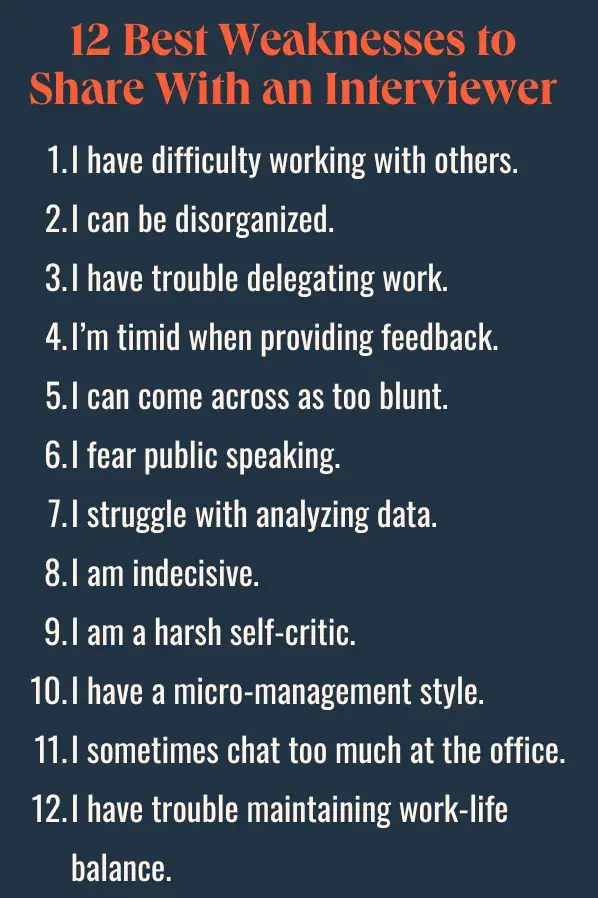
3. “I have trouble delegating work.”
Sample Answer:
Related Resources:
How to Delegate as a Leader
How to Delegate Your Work to ChatGPT Podcast
4. “I’m timid when providing feedback.”
Sample Answer:
Related Resources:
Why Introverts Make Great Leaders Video
Tips for Giving Feedback
How to Give Negative Feedback
5. “I can come across as too blunt.”
Sample Answer:
Related Resources:
Free Personality Tests
How to Communicate Like a Leader
6. “I fear public speaking.”
Sample Answer:
Related Resources:
Public Speaking Tips From Speakers & Communication Experts
Tips for Mastering Public Speaking
7. “I struggle with analyzing data.”
Sample Answer:
Related Resources:
Excel Data Analysis Lesson
Free Analytics Resources
8. “I am indecisive.”
Sample Answer:
Related Resources:
Strategic Decision Making Lesson
Decision Trees
Decision Making in Management
9. “I am a harsh self-critic.”
Sample Answer:
Related Resources:
Critical Thinking Foundations Lesson
Your Inner Critic Is a Big Jerk Podcast
10. “I have a micro-management style.”
Sample Answer:
Related Resources:
Management Styles to Strive for and Avoid
Management by Objectives
11. “I sometimes chat too much at the office.”
Sample Answer:
Related Resources:
How to Build Business Relationships
Hubspot & Zapier CMOs Share Their Career Advice Video
12. “I have trouble maintaining work-life balance.”
Sample Answer:
Related Resources:
Secrets to Work-Life Balance
Work-Life Balance Hacks
Work-Life Integration
How to Identify Your Greatest Weakness
1. Rule out any skills that are listed in the job description.
2. Consider weaknesses that you have overcome.
3. Find inspiration by looking through old performance reviews.
How to Answer “What Are Your Greatest Weaknesses?”
1. Be honest and choose a real weakness.
2. Provide an example of how you've worked to improve your weakness or learn a new skill to combat the issue.
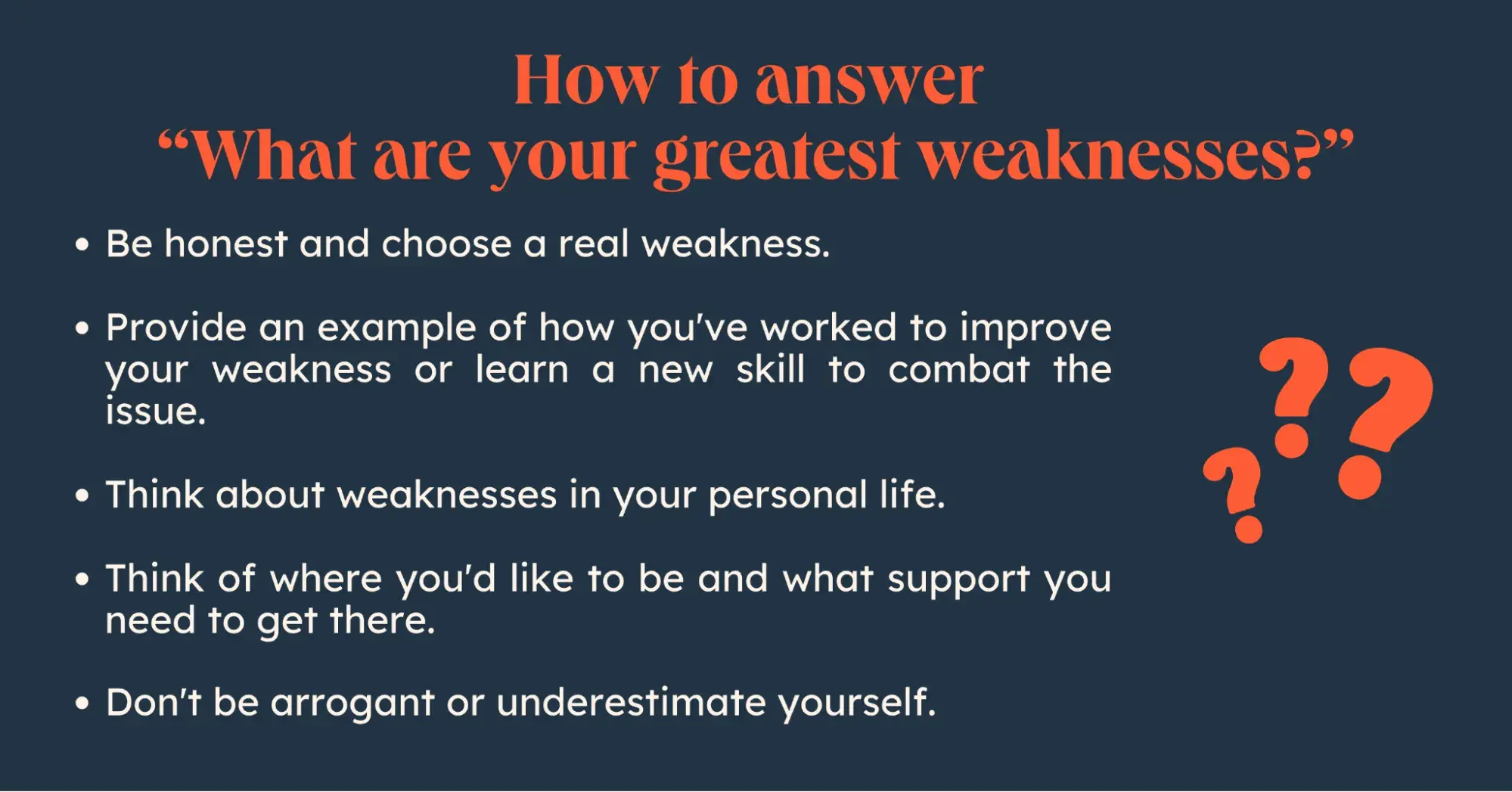
3. Think about weaknesses in your personal life.
4. Think of where you'd like to be and what support you need to get there.
5. Don't be arrogant or underestimate yourself.
5 Tips for Talking About Weaknesses in Job Interviews
1. Practice your answer beforehand.
2. Look the interviewer in the eye and project confidence.
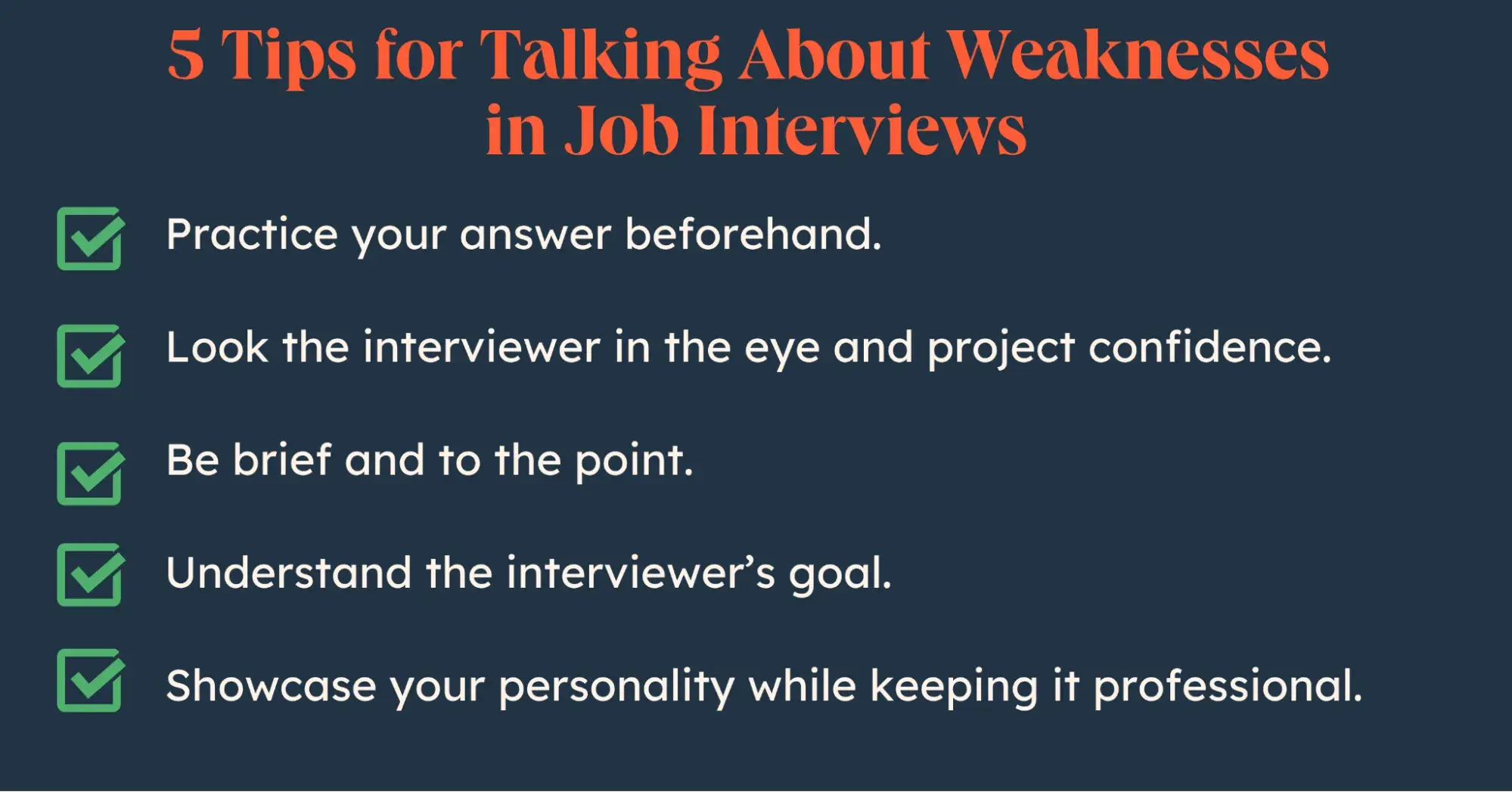
3. Be brief and to the point.
4. Understand the interviewer’s goal.
5. Showcase your personality while keeping it professional.
There's Strength in Every Weakness

 Konoly
Konoly ![50 Common Interview Questions [Download Now]](https://no-cache.hubspot.com/cta/default/53/aac5dac8-7420-4881-a73f-ee611981ae3a.png)









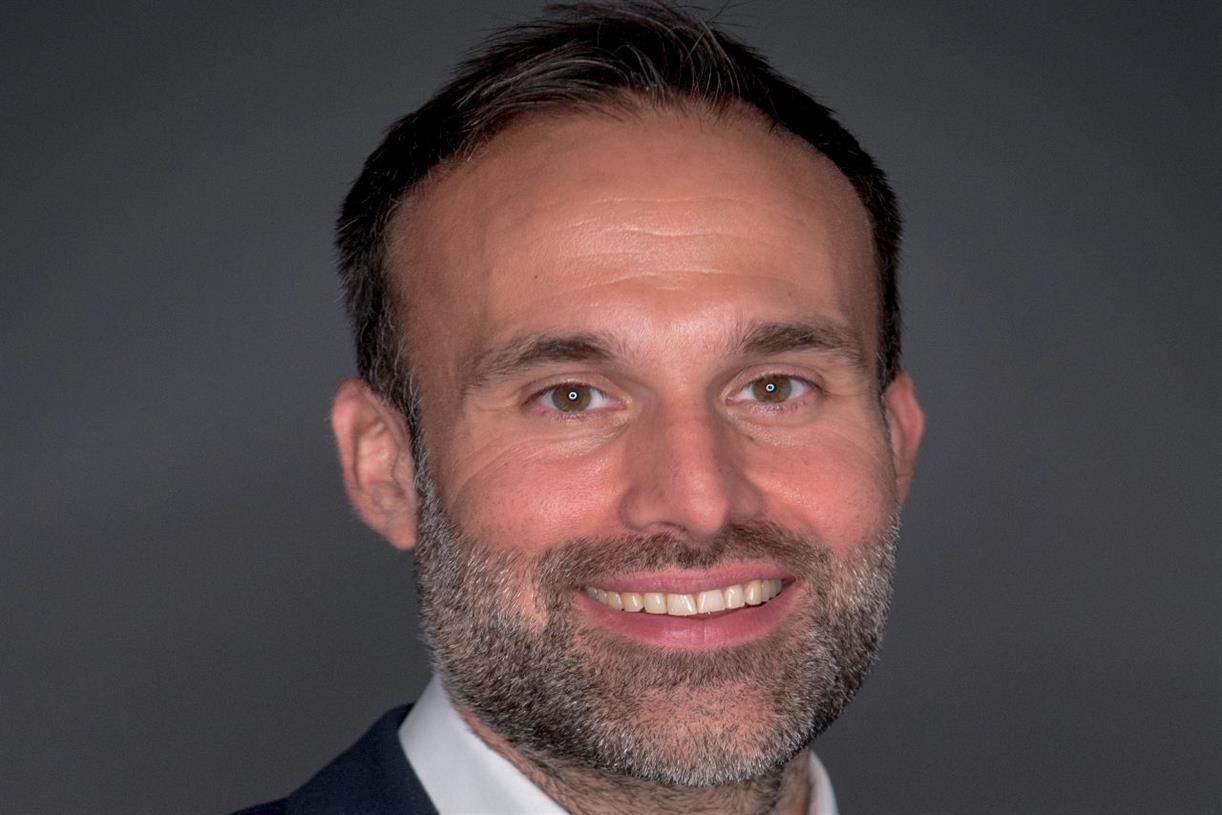
_2.jpg)
